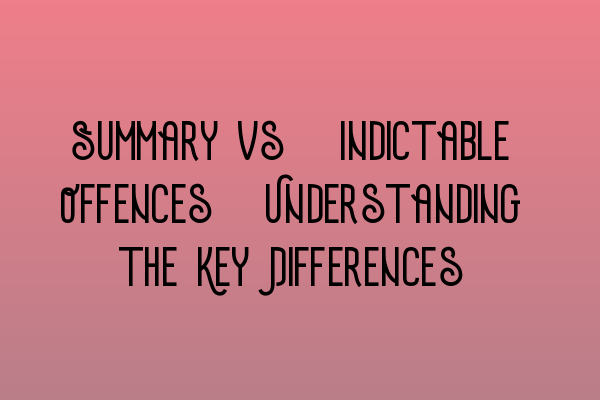Summary vs. Indictable Offences: Understanding the Key Differences
When it comes to criminal law in the UK, there are two main categories of offences: summary offences and indictable offences. Understanding the differences between these two types of offences is essential for legal professionals, law students, and anyone with an interest in criminal law. In this article, we will explore the key distinctions between summary and indictable offences, providing a comprehensive overview that will help clarify their unique characteristics.
Summary Offences
Summary offences, also known as minor offences, are relatively less serious crimes that are typically triable in a Magistrates’ Court. These offences are regulated by the Magistrates’ Courts Act 1980 and include offenses such as petty theft, criminal damage, and disorderly conduct. Summary offenses are usually dealt with swiftly and have a lower maximum sentence compared to indictable offences. However, it’s important to note that some summary offences can be elevated to indictable offences if certain conditions are met.
Characteristics of Summary Offences
- Typically less serious crimes
- Triable in a Magistrates’ Court
- Regulated by the Magistrates’ Courts Act 1980
- Include offenses such as petty theft, criminal damage, and disorderly conduct
- Usually dealt with swiftly
- Have a lower maximum sentence compared to indictable offences
If you are planning to become a solicitor in the UK, it is crucial to have a solid understanding of summary offences as they often form the basis of legal practice. Assessing and representing clients charged with summary offences requires specific knowledge and expertise.
To successfully pass the Solicitors Qualifying Examination (SQE) and become a qualified solicitor, it is essential to have comprehensive study materials that cover all aspects of criminal law, including summary offences. Check out our related article, “SQE Exam Prep: Essential Study Materials for Aspiring Solicitors”, to discover the best study resources for your SQE preparation.
Indictable Offences
Indictable offences, also known as serious offenses, are crimes that are tried in the Crown Court and carry higher maximum penalties. These offences can cover a wide range of criminal activities, such as murder, rape, robbery, and drug trafficking. Indictable offences are considered more complex and serious than summary offences, and they require a higher level of judicial involvement and expertise.
Characteristics of Indictable Offences
- More serious crimes
- Tried in the Crown Court
- Carry higher maximum penalties
- Include offenses such as murder, rape, robbery, and drug trafficking
- Require a higher level of judicial involvement and expertise
If you are a law student or aspiring solicitor, it is vital to gain a comprehensive understanding of indictable offences. Knowing the nuances and intricacies of these offences can significantly enhance your legal skills and ability to advocate for your clients.
Demystifying the Solicitors Qualifying Examination Format
To learn more about the process of qualifying as a solicitor in the UK, check out our related article, “Demystifying the Solicitors Qualifying Examination Format.” This article provides valuable insights into the various components of the SQE exam and offers tips for effective preparation.
Summary vs. Indictable Offences: Key Differences
Now that we have discussed the characteristics of summary and indictable offences individually, it is essential to highlight the key differences between these two categories.
- Trial Venue: Summary offences are tried in a Magistrates’ Court, whereas indictable offences are tried in the Crown Court.
- Sentencing: Summary offences generally carry lower maximum penalties compared to indictable offences, which can result in more severe sentences.
- Complexity: Indictable offences are typically more complex due to the seriousness of the crimes involved, requiring a more in-depth investigation, evidence gathering, and legal analysis.
- Level of Judicial Involvement: Summary offences are often administratively dealt with by the magistrates, while indictable offences involve more comprehensive judicial involvement, including the role of a jury.
To further enhance your understanding of criminal law and the SQE exam, we recommend exploring our related article, “SQE Exam for International Lawyers: Challenges and Success Strategies.” This article provides guidance for international lawyers preparing for the SQE exam and navigating the nuances of the UK legal system.
Conclusion
Understanding the key differences between summary and indictable offences is crucial for legal professionals and law students alike. Whether you are involved in criminal law practice or preparing for the SQE exam, a solid grasp of these distinctions will undoubtedly enhance your expertise and ability to navigate the complexities of the UK legal system. By studying the characteristics, sentencing, complexity, and trial venues of summary and indictable offences, you will be well-equipped to handle cases in a competent and efficient manner.
If you are interested in forming an LLC in the UK, don’t miss out on our comprehensive guides:
